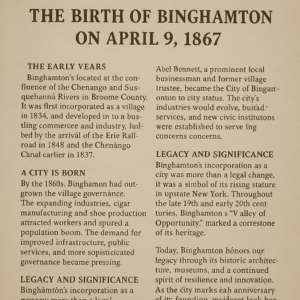The Birth of the City of Binghamton: From Village to City on April 9, 1867
On April 9, 1867, the Village of Binghamton officially became the City of Binghamton—a major milestone in the history of this Southern Tier community in New York State. This transformation marked the beginning of Binghamton’s rise as a center of industry, innovation, and culture. With a rich history rooted in transportation, manufacturing, and civic development, the city’s incorporation reflects the growth and ambition that continues to define Binghamton today.
Early History of Binghamton, NY
Before its incorporation as a city, the area now known as Binghamton was originally inhabited by the Iroquois Confederacy, particularly the Onondaga people. European-American settlement began in the late 18th century, after the American Revolution, when Philadelphia businessman William Bingham acquired land in the region. The settlement that grew up around this land purchase would eventually take his name.
Strategic Location and Transportation
Thanks to its location at the confluence of the Susquehanna and Chenango Rivers, Binghamton became a natural center for trade and transport. In 1834, it was officially incorporated as a village. Key infrastructure developments—like the Chenango Canal in 1837 and the Erie Railroad in 1848—transformed the area into a transportation and logistics hub in upstate New York.
These developments fueled economic expansion and population growth, setting the stage for Binghamton’s transformation into a city.
Binghamton Becomes a City on April 9, 1867
By the 1860s, the Village of Binghamton had outgrown its existing municipal structure. With industries booming—particularly cigar manufacturing, textiles, and shoe production—and population numbers rising, the need for a more robust city government became clear.
On April 9, 1867, the New York State Legislature passed a charter officially incorporating the City of Binghamton. This change allowed the city to elect a mayor, establish a city council, and manage vital services such as police, fire protection, sanitation, and public works.
Abel Bennett: Binghamton’s First Mayor
Abel Bennett, a respected businessman and civic leader, became Binghamton’s first mayor. Under his leadership, the new city government took immediate steps to modernize its infrastructure, expand educational facilities, and improve public services. His early administration laid the foundation for a city that would continue to grow in regional and national importance.
Economic Growth and the Rise of Industry in Binghamton
During the late 19th and early 20th centuries, Binghamton became known as the “Parlor City”—a nickname reflecting its reputation for orderly streets, elegant homes, and civic pride. Its industries attracted a diverse immigrant population, including Irish, German, Italian, and Eastern European communities.
Major companies such as the Endicott Johnson Shoe Company and, later, IBM, played crucial roles in shaping Binghamton’s economy and identity. By the mid-20th century, Binghamton had earned a reputation as a high-tech and manufacturing hub, as well as a center for education, bolstered by the founding of Binghamton University in 1946.
Cultural and Civic Development
As Binghamton grew, so did its cultural footprint. The city became home to public schools, libraries, churches, and theaters, reflecting the diverse backgrounds of its residents. Civic pride and community involvement have long been central to Binghamton’s character.
The city’s historical architecture, parks, and preserved landmarks serve as daily reminders of its rich past and enduring spirit.
Legacy of April 9, 1867: Binghamton’s Founding as a City
Today, April 9th is celebrated as the anniversary of Binghamton’s incorporation as a city—a pivotal moment in the community’s development. The move from village to city was more than a bureaucratic step; it was a bold declaration of Binghamton’s future.
More than 150 years later, the City of Binghamton continues to evolve, balancing its historical roots with modern innovation. Whether through economic revitalization, cultural events, or preservation of historic sites, Binghamton remains a proud symbol of growth, resilience, and opportunity.
For temperature controlled storage or non temperature controlled storage call 607-775-9776 or visit www.laingselfstorage.com. We have locations in Endwell, Endicott, Binghamton, & Conklin.

